Learn to make income with a podcast
Join the 5-day training
Profitable Podcast Bootcamp
Come Hang Out!
Learn How to Consistently
Make Income With a Podcast
For Faith-Led Entrepreneurs
Join 5-Day Profitable Podcast Bootcamp!
Podcast Launch Checklist
Steps to start and launch a podcast from start to finish
Should You
Start a Podcast?
TAKE THE QUIZ
AND FIND OUT
STEP BY STEP PLAN TO START YOUR ONLINE BUSINESS
Complete Business Blueprint
Is My Group Coaching Program Right For You?
Choose the option below that best describes you!
Have a question?
Ask Stef a question about her resources
or program!
Will podcasting make you money?
Play around with my Profitability Calculator!
Meet Podcast to Profit Alumni
Students and graduates who are profiting from their podcasts
from psalm chapter 18
Spiritual Battle Plan
defeat the enemy, strongholds and spiritual warfare
Hey sis!
Today I have a treat. Do you need to figure out your niche?! You’re in luck. I am doing a FULL live coaching breakthrough session with Jessica Grout. We are unscrambling all the thoughts, worries, and confusion and mapping out a clear plan for her brand.
We walk through so much in today’s episode from figuring out her common denominator to fine-tuning her niche, to podcast mapping, and finally, end with a discussion of what her course can (and will) be!
Yo girl can WERK in an hour!
If you’ve been struggling with KNOWING your ‘thing’ please listen in. Be a fly on the wall and do all of the coaching right alongside us. Put yourself in Jessica’s position and answer the questions as if I was talking to you. See what God has in store for you. Come share any breakthroughs with me on IG.
Enjoy.


FULL EPISODE TRANSCRIPTION:
(00:01):
What’s up girl, you’re going to love today’s episode. Oh my goodness. It exceeded all of my wildest dreams. I invited my friend and personal empowered eating coach, Jess Brown on to talk about the art of listening. She actually has this incredible skillset when it comes to listening that she’s been trained on as a dietician who works a lot with clients and helping people break free from the food cycles, but she uses it, not just in her business, but in her, her life, her marriage with her children.
(00:30):
It’s something that like I truly admire in her. I asked her to come on and train us all about trying to find all the cool words that she used. Motivational interviewing, rephrasing, recapture reflection, and all of these amazing modalities that I had no idea we could utilize to become better, more purposeful intentional listeners in our lives.
(00:59):
You are going to be blown away. I know you’re going to love it. Now, before we dig into today’s episode, just a few things, sister, Fran, number one, I want to let you know that I am. I have committed. I have committed to Lydia my new Facebook community manager, that I’m going to go live every other week in the free Facebook community. These are going to be on Wednesdays and they are going to be trainings that nobody else gets to see.
(01:24):
I’m going to train on your questions, live Q and a for you deeper dives into podcast topics, and it’s going to be so super epic. So be sure that you’re part of my Facebook community that kicks off next week, actually Bitly slash success support group. Number two, let’s work together, girl, you and me. If you need clarity on your calling, I want you to go to clarifyyourcallingcourse.com.
(01:50):
It’s time for you to know without the shadow of a doubt, what you do, how you do it, who you serve. I want you to build a business outline from your God led calling, or you have clarity, but you’re tired of marketing online, your business. Isn’t growing the leads aren’t coming in and you’re kind of stuck. I want you to start a podcast. This is how we grow a hugely successful organic audience that come to you. You’re not even pushing. You’re just pulling. Bring all the leads to the yard.
(02:21):
Honey, hang out with me on the pod. People come because of the SEO, the titles and the visibility strategies that I teach you inside of podcast pro university, you can find out more at podcastprouniversity.com last but not least, you have a podcast, but you want to scale. You want to rank, you want your show to become your actual business driver, the catalyst, and you need a monetization plan.
You need a course, a program or coaching offer to monetize. I want you to join me in the next round of podcast to profit, which is starting August the week of August 2nd. You can get your application in at podcastatprofitmastermind.com.
(03:03):
I know so many links. If you don’t remember any of those links, you guys just go to stefaniegass.com. Everything I ever mentioned is on my website. Okay? So let’s dig in today’s show, grab a notebook and pen. This is about to blow.
(03:25):
All right. Sitting across from my beautiful friend and intuitive eating coach, Jess Brown, you guys have heard me talk about her. She was actually the fifth guest ever, or the fifth episode. Yeah, that’s Right. That’s right. Way back in 2018,
(04:36):
She’s a beautiful sunshine in my life. She has so many gifts. Obviously one of them being her gift of helping people break free from diet culture and get off that wheel of constantly thinking that we have to be a certain weight or a certain size or any of that.
(04:54):
She’s broken me free of that after only 35 years of obsessed. So if you guys need help in that area, her podcast is Fuel Her Awesome podcast. She has an amazing course that can help you as well, but that’s not why she’s here today. So if you guys are looking for that, go hang out with Jeff.
(05:15):
Why Jess is here today is because while we work together, we’ve actually known each other. Since middle school, we’ve become friends and we’ve become close again after so many decades, which is super fun. But I noticed something about Jessica that I don’t notice about many people.
(05:31):
She has this beautiful gift of listening. When you text Jess something, she doesn’t reply back with something about herself. She doesn’t reply back with like, oh, that’s cool. Then turn the conversation to herself, which I’ve noticed. 90% of people do myself included. She takes this beautiful time to like really see you and hear you. She reciprocates with questions and validations. I told her my goodness, every time I text you, I feel so seen.
(05:58):
It was like this thing I didn’t realize I needed and was looking for in my friendships, what I would love to see in my marriage. But I would love to see from myself. I asked her what I just want you to know. She was like, oh my gosh, well, I wasn’t just born with that thing. I study. A thing that I’ve been certified in. So she’s on the pod today to teach us about listening. So hi, Jess, welcome to the show.
(06:23):
Thank you. Thank you. I’m so glad to be back. Thanks so much for having me and for all the nice things you just said, that was really good to hear. I’m sitting over here with a big smile on my face. Just feeling like this virtual hug right now. Yeah. When you texted me that stuff, I one, I appreciated it.
(06:40):
I felt really validated because it is something I have very specifically worked on in my career, which like then really awesomely bled on over to my personal life and friendships. You’re asking me this before we started, like, do I use it more in my personal life or my business? It’s been a blessing in both areas. It was really cool when you, you noticed that it was really validating.
(07:05):
That’s so cool. Well, it, it matters. I think it makes a big difference in a society where we’re so distracted. We’re so egocentric we’re so all about ourselves to go, whoa, there are a few people out there that are really listening. What is that? Talk to me like, so you said this isn’t something, I was just born with this gift of listening. What is it called Jess? Kind of just walk us through this amazing art that you have. You’re perfecting, you’re working on constantly.
(07:33):
Totally. Yeah. It’s something I have to constantly go back to. Cause I think it is our human nature to, especially as busy moms, right. Where we’ve got a million balls in the air and it’s like, somebody can text us or call us and tell us something going on. It’s like, we hear it, we see it. We feel it, but we’re already onto the next thing. So believe me, this is something that I have to remind myself of on the daily.
(07:55):
Like when I was preparing for this podcast, I was reviewing my notes and I was like, oh yeah, there’s a cool thing. I did. I forgot about that piece. But what it is, is it’s actually called motivational interviewing is what I’ve been trained on. It’s a person centered collaborative approach with like this goal of creating change, talk in your clients or the person you’re working with.
(08:15):
It’s a therapeutic modality, but it’s a little bit different than all of the other pieces I’ve studied, especially in the world of dietetics. Cause in the world of dietetics, it’s like, you know, we know nutrition facts, and then we’re helping. We’re trying to we’re trying to teach people on how to ignite those nutrition behavior changes in their life.
(08:36):
Motivational interviewing is this art of like meeting the person where they’re at and really working to help them see the strengths. They already have validate the emotions or experience in this process and walk them towards change, talk that they say themselves. So instead of me saying like, oh, this is, you need to do X, Y, and Z with your diet. It’s like, I’m asking questions.
(08:59):
Strategically I’m using something called reflective listening, which I think is going to be most helpful to talk about today with on the podcast is what is reflective listening. Because that’s what you picked up on was the fact that it’s like you felt heard and seen, and it’s really this thing called reflective listening.
(09:17):
Wow. So a few things you said, you said that it’s person centered talk and then you said meeting them where they’re at by asking leading questions that validate them and highlight their strengths. So can we dig into that first part a little bit? Like what is the difference, or I guess just start me with that. Like what does that mean? Let’s take like, let’s take one of your client examples. We can have a visual of what that means and then maybe let’s take like a motherhood example. Okay. So reflective listening.
(09:52):
Okay. So if you’ve got someone coming in, like in my, in my work world, if someone comes in and is like let’s say I want to add exercise to my weekly routine. So instead of me jumping right into like, okay, you need to exercise five days a week, 30 minutes a day, but I get two of those weightlifting, like the list of things that, you know, we go to, and instead I would start, start asking questions and get to like, what is their story?
(10:15):
So I might say something like it’s and here’s the reflective listening piece. You see the goal is to like start with the reflective listening and then ask questions. So I might start it with like, gosh, it sounds like you’ve put a lot of thought into how exercise might impact your world and your quality of life and how you feel. Tell me a little bit more about what you see happening with you adding exercise into your life.
(10:42):
So it’s like, instead of going to the quick to-do list, we sit there for a minute with our clients and we get to know where they’re coming from. Just that statement, I’m already validating the work that they’ve done, right? Like you’ve already thought about this. I can tell you that you’ve looked at how this might impact your life. Now let’s talk about what you, what you notice and what, what brought you.
(11:03):
Okay. So you’re looking for opportunities to validate the fact that they’re even in your office, you’re looking for reasons to validate the fact that they want to integrate exercise. You’re saying, oh my gosh, I’m super proud of you. You’re here. You know, that exercise is going to bring more energy to you. Tell me a bit about why you think it’s important to add exercise at this point in your life. It’s like, you’re validating. Then you’re bringing it back to questions, which almost for your client, like solidifies them, sitting in that room because they’re like, well, I want to feel more energetic.
(11:35):
Like I remember when I sat down with you for the first time, when we started doing the work on, on my own eating plan, it was like, what do you really want in the next 90 days? Me putting all of these things out to youand you wrote them all down. Then were able to like, keep bringing me back to things I had said, instead of things, Jess was putting on me to do it was like, remember what you wanted, remember the goal, remember what you said.
(12:00):
I think that’s a really important piece of any conversation. Look for opportunities to validate first. I see you. I hear you basically, and then ask the question that brings out of them, why they’re bringing this thing to you, right? Like, so, so let’s look at a mom example.
(12:20):
So I love this with kids because they feel that validation so much. You know, like actually my little boy just colored, he colored this beautiful picture. So it was gorgeous. He colored it and he brought it to me. I think we kind of naturally do this as moms. So we might just notice how we do it and then try to pull it onto our, our work life.
(12:40):
But, you know, he brought it to me and I was like, oh, Ronan, that is a beautiful picture. I love how you use so many colors. I love how you use your creativity and you didn’t just color it the way that other picture was. Cause he was, it was a Pokemon. He was coloring. You know, you have like a picture that told him which colors it should be. Then he used his imagination.
(13:00):
So I pointed out all his internal strengths right away. It’s so cute to see it with kids because of course, as I’m saying this, like his face is lighting up, you know, his smile is getting bigger and then he just comes over and hugs me and he goes, yeah, mama, I’m a really good artist, you know? So he feels it. I think, I do think as moms, it is a really natural to do that with our kids to like notice them and praise them and we can almost see how we do it in mama hood and then pull it into our work world and our clients.
(13:31):
Cause it’s something that I think, you know, when we’re in work mode that, well, I guess our to do list is always in our brain, but when we’re sitting across from a client, usually we have like this agenda that we need to stick to. Whereas with our kids, it’s, it’s a little bit easier to, you know, be in the moment with them. That’s really what it is. It’s like you’re in the moment with them validating how awesome they are. Then did you ask
(13:53):
Him a leading question after that? Or was that one like, okay, we just did the validation in this one scenario. Where did you look for a way to ask him a question?
(14:02):
So the question is like the whole point of it that is like create change, talk. So an example with this one, I guess that’s probably not the best example cause we weren’t trying to change anything. You know, that was just validating his, his experience.
(14:14):
I’m trying to think of an example, you know, with that, I guess with my other son, who’s six, he came home from school today the other day and he had kind of, you know, he had had a little fight with one of the guys at his school and not an actual fight, but you know, he was like, this guy said something mean to me and I didn’t like it mama. So at first I validated the inside. It sounds like that was really like upsetting, you know, it sounds like you were mad, it sounds like it hurts your feelings.
(14:44):
We went through that and he went through the feelings piece and then I asked him, you know, what did you do about it and what do you want do about it? So we walked through that and then at the end of it, like it it’s using open-ended questions. So it’s not just like, did it make you upset?
(14:59):
Yes, mom, you know, were you mad? Yes, mom it’s what do you wish you could have done differently? What do you wish he would have done differently? It’s asking that open-ended question so he can get back to you and, and really like hear himself, you know, it’s like verbally processing the situation. Yeah.
(15:15):
Then what do you want next time if this happened? Right? Like to come to an outcome to come to that. So I liked that. I liked that the validation is the you’re seen, heard and validated. Then the second tier question piece is to create some change or create at least a plan for change, right? A plan to start eating healthier, integrate the exercise, not fight with the kid at school blank link link. So like, I really like that, that it’s that changed. The question equals the change.
(15:47):
This is so interesting because as I sit here and I’m like, well, you know, I meet with clients, you meet with clients. A lot of the women listening, maybe have a coaching business or whatever. How do we have these conversations? Our brain is loaded with the, okay. In an hour, I have a framework.
(16:03):
I got to get someone through or in an hour, I’ve got to go through intuitive eating plan with somebody. How do we take this time? How much time should this process, the motivational interviewing take? When do we start implementing the, okay, so now do blinks our like solutions it onto that.
(16:22):
Totally. Yeah. It’s, it’s tricky because on the one hand we want to make sure they get everything they need from us in that hour. Right. We don’t want them to end the session with, well, what did we just do? You know, other than just chat. So there is little pieces to remember. So number one, I do this is one of the quotes I learned in my first motivational interviewing training.
(16:42):
It was, people do not care how much, you know, until they know how much you care. So really finding and respecting the value of taking the time to just kind of sit with your client for a minute. This was a huge ego check with me when I started, because when I came out of school, I was excited about nutrition. I wanted everyone to know everything I know about nutrition.
(17:03):
I very quickly learned that when I came into sessions, like, you know, just words, spilling and spewing, all my facts, like people didn’t care, you know, they’re like, that’s cool, Jess. I mean, that’s, I’m glad you find that interesting. Like I just do not care.
(17:18):
I found if I could sit with my clients for a good 10 to 15 minutes and really get a feel for how their week was, what kind of mood they’re in today, like it made the next 45, much more productive because I was figuring out where they’re at in that first 15 minutes. So I could meet them in that place and provide helpful information, not just general information.
(17:44):
That’s really good, helpful versus general that you’re able to, if you take that five, 10 or 15 minutes in that client session to hear them validate them, ask the leading questions to find the change they want to make, then you have targeted coaching back at them.
(17:59):
Yes. One thing I do to help keep myself in because I will get like, so into their emotions, I’ll stay there too long. We gotta get back to what we’re we’re doing. So at the beginning of every session, I will say, Hey, what is one thing? Is there one thing that you’re really hoping to walk away with today? So at least I have in the back of my head, what their agenda was. I think the other thing is really like checking our own agenda.
(18:24):
This is where I’ve had to really challenge myself in the work I do is checking like what I want to get done in that session. Like giving enough space for my client to show up, bring their emotion, their struggles, and then kind of trying to weed through, okay, this is, I know this umbrella of stuff about food, but I’ve got to figure out what’s actually going to help them and meet them where they’re at today based on what they want to walk away with and how they’re feeling in this moment and this season of life.
(18:53):
Yeah, that’s really good. I asked that same question. When I sit down with the client, number one thing we’re doing today, whether it’s 30 minutes session an hour, whether it’s four months, what’s the biggest thing you want to accomplish today. Then at the end of this four month period, and I same thing as you, I didn’t know. I don’t think I was doing it to this extent, but I would let them talk for about 10 minutes, right?
(19:12):
Like where you’re at, tell me what you’ve been stuck on. I don’t, I think I’ve been missing the validation part though. Jess, like, I’m good at the questions, but I was missing the validation of like, I understand how you feel when you say that I enter like just action with them instead of getting straight to the do, do, do, do, do piece. So I love that.
(19:33):
Definitely with your example with your son in the picture too, like land and I drew a picture of the other day and we did rainbow instead of brown for the dinosaurs. I’m like, wow, I could have said, you know, what a great unique idea, like nobody chooses cool rainbow colors for their dinosaur. That was so creative of you. Yeah. So opportunity to validate and that’s just uplifting.
(20:01):
Right? Right. Yeah. This is where it’s been so amazing in my personal life. Like when I first started training with this, I actually practiced the most in my marriage. It was incredible what it did. My husband, he and I are very different.
(20:16):
Our personalities, like I’m a go, go, go kind of person. He is a like, let’s chill kind of person. So when I started implementing some of this reflective listening, which I think you actually are really, really good at, especially like you do it naturally when you interview people on the podcast, because I listen to your podcast too.
(20:34):
You know, when somebody says something, you it’s, you do the reflective listening, which is basically there’s different types, but it’s rephrasing and like recapturing what they said and you do an amazing job at it. But I started doing it with my husband and it was really cool to see how it impacted our conversation because all of a sudden he felt exactly what you said he felt seen and heard.
(20:58):
Even though you know, he’s in law enforcement, so here I am in like nutrition therapy, two totally different worlds. I know nothing. I can’t even comprehend, you know, the stuff he sees on a daily basis. But for me to sit there and say, oh, that sounds like a crazy day. I try to like label some of the emotions that he might feel really validated him.
(21:20):
Here’s one of the things that I think is super important to know when you’re trying this it’s okay if you’re wrong. So if I go, if my husband came home and said, you know, he went on a really tough call and I’m trying to hear him. I say, gosh, that sounds like it was really, I feel that sounds like it’d be really like anxiety provoking. Maybe he’s like, no, actually it wasn’t, it was this or whatever. It’s okay. That I’m wrong. Because what I did is I helped him identify what his emotion was. Cause I said the wrong one. He goes, no, no, no.
(21:53):
That’s not how I’m feeling. This is how I’m feeling. The connection is still there and it’s actually amplified. So I think that’s really important because a lot of people get kind of hung up on like, what if I reflect wrong? Or what if I don’t capture what they’re saying correctly? That’s okay. They will clarify it for you. The connection just builds. That’s so
(22:12):
Good too, because how many of your husbands aren’t the best at emotional conversation? This is the easiest trick to get them to be. Yes. I think it would help me listen so much better because my husband will talk about his has work and he’s a manager and he has all this employee drama and I kinda zone out a little bit. I’m like, yeah, that sounds like it’s kind of
(22:33):
Hard to understand. Yeah. Like, but if
(22:35):
You were actively looking for these validation responses, these reflective listening cues, actively listening at a deeper level, which we need to be doing as a society and especially as wives and moms is really listening and caring about what they’re saying. So I’m really excited about that. One when it comes to husband has worked talk because I’m going to craft that. I think that’s really good. So have we covered all the pieces of how am I works? Because I think we should do some role-play to give some examples.
(23:09):
Totally. So there’s, there’s it’s so am I is a huge rabbit hole. There’s, it’s based on five different principles and that’s probably way too much to like go over in here. But one of the things I think would be helpful is to talk about the five different reflections that you can use because the, so the fun fact that I came across when I was reviewing for this was that when you’re doing motivational interviewing, you want to combine like at least a two to one ratio of reflections to questions.
(23:38):
This is so hard for me stuff. Cause I am an inquisitive person. I want to know more, but the research really shows that if you can use two reflections to everyone, question, the connection is built and you’ll get better, more thorough answers. But if you keep asking questions, people start to feel like they’re interrogated.
(23:57):
So they tend to back off a little. So these reflective techniques, so there’s five there’s repeat, rephrase, paraphrase double-sided and amplified. I’ll tell you what each of those mean. Okay. So the repeat is very, I mean, it’s what it says. It’s basically you repeat what the person said, and this is, am I in its most simple form and something, when we do trainings, this is how we start. It sounds really weird and hokey, but it’s just how you get comfortable doing it. So like, Stef, tell me about your morning.
(24:29):
So this morning was super relaxing. I loved it. The weather’s beautiful drop miles off at school land. I did a bike ride to go pick up the trash can at the bottom of the street. I had a meeting with my Facebook community and marketing manager, and now I’m sitting with you and I’m still in my PJ pants.
(24:45):
It sounds like it was a beautiful morning, lots of activity you got through some to-do lists and then you you’re here today and you’re still in your pajamas. That is called a repeat, like I picked on just specific key phrases that you already said this is not my favorite reflective listening technique because it sounds kind of robotic and yeah. So it’s not my favorite, but it’s a good place to start.
(25:09):
Yeah. It’s an easy one to start with some very easy simple.
(25:12):
Yes. So the next one would be rephrase it. So gosh, it sounds stuff like you had a gorgeous morning, like outside beautiful weather. That’s what your son bike ride. Then you got through some of your to-do lists and that just kind of feels so like accomplished, you know, you feel so accomplished during the day. Then here you are buzzing around, still in your pajamas with a big smile on your face from this morning and doing the podcast. So it’s like rephrasing it kind of adding some of your own language.
(25:43):
This one’s really fun. Cause you can, you can get like metaphorical with it when people are talking about certain situations, you could say like, oh, that reminds me of like when you’re, I can’t think of an example right now it’ll come, we’ll get, let’s do some more role-playing it’ll come. So we’ve got that. We’ve got paraphrasing, which is just kind of shortening what they said.
(26:05):
So that’s like, if you’re in a time crunch, it’s like, so it sounds like you had a super busy morning, but it was so beautiful. Like you still got to enjoy the morning with your son and didn’t skip a beat. Cause here you are podcasting.
(26:17):
Right? Okay. So we’re paraphrase it. Yep.
(26:22):
Now the amplified reflection is really honing in on the emotion. Like kind of, it sounds like a super chill morning stuff. Like how relaxing and you look relaxed. You’re still in your pajamas.
(26:36):
Yeah. Okay. Okay. So you’re really focusing on the emotion. Yep. What about the double S double?
(26:42):
So the double is when someone is coming to you with a struggle. So do you have I mean what’s something you’re, you’re struggling with right now, not to put you on the spot or you’re saying right.
(26:59):
Was struggling with getting through all the laundry because my goal is to only have to do one load every other day, but when I let it pile up, there’s so much I can’t get to my baseline. So I’m literally working through that for the past four days in a row, trying to get to ground zero.
(27:16):
So it sounds like you are frustrated because laundry is never-ending. The pilot just seems to get higher and higher. On the one hand, you want it done and, you don’t want the pile there, but on the other hand, you don’t want to do it every single day. So what I’m trying to do here is like pick up, like, what’s the problem. It’s like, you want it done, but you don’t want to do it every single day.
(27:40):
You actually already were kind of working through some of it because you’ve thought like, okay, I want to do it every other day. So it’s like, okay, on the one hand, do you want it done? You want to do it, you know, you don’t want to do it every day. So you’re thinking of doing it every other day, but it’s still not getting done like that every other day might still not be enough. How are you going to not do it every day, but not have this giant pile every other day. So you led into a question. Okay. Am I supposed to.
(28:08):
You can’t. Yeah. What are you gonna do about that? That sounds like a pain. Well,
(28:12):
Here’s my plan today is super light. Like I have you and one 30 minute client going to take one hour and just completely finished so that I am back at ground zero and then I’m putting it in the planner every other day to stay on top of it, because that feels really low pressure to me versus letting it get crazy.
(28:31):
Yeah. So it’s like, you can kind of just start over clear the plate, get it started again today and restart tomorrow. Now if you restart tomorrow, how do you think that’s going to look over the next week? Are you going to be able to do it every other day?
(28:44):
Yeah, I think so. Awesome. So see,
(28:46):
I actually made a mistake there. I asked you a question that was closed ended, like you just said.
(28:50):
Yeah. Oh, so, okay. So how are you going to fit it in? The next were going on the planner, right? How much time is it going to take you, have you thought through that? Can you ask for help? Have you asked the kids like so leading into more solutions right. For that person? So those are the five types of reflection. We’re going to use two reflection to one question. Let’s do another role-play that’s just authentic.
(29:16):
Let me pray. Let me, yeah, let’s do it. Let’s do it. Well, let’s talk
(29:21):
About your podcast. Just let’s come together coach for a second. Okay. Can you bring to me some update about your show or whatever? Okay. So
(29:30):
I need to think of something that I’m like one of my problems, because okay. So as you know, cause you’re my coach, I’m coming off a very busy season and I’m a little tired. So I’m feeling tired, drained, and I want to keep going because I’ve had, I felt very blessed with the launch of my podcast.
(29:54):
It’s open more doors than I knew existed and I’m, it’s fun. But at the same time, I’m tired. I woke up this morning trying to map out some of my content for the next few weeks. I’m just like, there’s nothing, it’s a blank slate right now.
(30:10):
I think it’s cause I’m so tired. Yeah. So it sounds like you’re feeling really excited about the opportunities that it’s created already for you, but that you’re burnt out. Maybe you’ve been working so much. You’re just feeling really exhausted.
(30:26):
Yeah. I’m so tired. It’s like I woke up the other day and I actually woke up at my normal time. I get up super early. This is gross. I get up at like 4:15 AM. I know my boys get up really early. So that’s like my that’s the only way I can have quiet time is if I get up that early. So the other morning I did not get up and I hit snooze and I slept until six 15, which is the first time I’ve done that. Not on a Saturday since like January, it felt so good. It felt so good to sleep in.
(31:01):
What I’m really hearing you say is that you want to rest and you felt so good when you finally took that time for yourself. But maybe you’re feeling a little bit guilty because you have so much to do. You want to keep pursuing this show. Is that as, is that hitting a button for you? Yes
(31:22):
It is. Yeah. Yeah. Cause I’m tired, but I can’t quit. I don’t want to quit.
(31:28):
So what do you think could be a solution for you to keep growing this podcast that you know is working really well? Cause you said it was super fun for you. You’re super excited, but at the same time, give Jess a little downtime to maybe recoup from that burnout that you’re feeling because launching a show is a lot and you launched it and you’ve grown it. We launched a course as well. It’s a lot. How do you, how can you balance the two and let’s say the next 30 days,
(31:57):
That’s beautiful. I just have to say that’s beautiful before I can even respond. Yeah. That’s great. Cause you did the double sided where you’re like on the one hand, you’re tired and you valid in, made me feel that. Then on the second hand or the other hand, you’re excited and you’ve put so much work into it.
(32:12):
So in the next 30 days, how can I do this? Well, I think I need to have some days off where I practice what you preach, which is, you know, turning social media off, email off all of it off and stay away from my phone, which I plan to do because we’re going to go camping three weekends in a row. So I’m going to turn it off. I think I’m going to try to find some intentional play in the middle of the cause I was doing that during quarantine.
(32:41):
This is total sidebar. But during time I would like take this time to just, I would go, we have a hot time. I’d sit in the hot tub with my kiddos and we’d have coffee. Like I felt like I was just living the dream life and I totally stopped doing that. So I’m, I think I’m going to start doing that again.
(32:56):
Okay. So two things you said to me, number one, you said I’m going to take some days off and it sounds like you’ve already planned on what days those are because you have three weekends coming up. Is that right? You’re committing with me. We’re going to plan those into the planner.
(33:11):
Delete social for those three weekends. Does that totally. Okay. The second thing you said to me is I’m going to start having more intentional play. One method you mentioned was the hot tub with the boys. How can you make sure that that happens just in the next 30?
(33:29):
It was, that’s a good question. You know, I, when I was doing it last year, I would do it after lunch. Like I’d get them lunch. I’ve kind of lunch real quick and I’d make coffee and we’d like sit in there for like 20 minutes. So I think I’ll do it after lunch. It was kind of our end of lunch ritual and then I’m okay. I can go back to my work and they can kind of go back and do their thing.
(33:50):
I mean, that sounds like a plan that brings you excitement. That’s super doable and that you can implement into your planner starting tomorrow.
(33:57):
Yeah. Then the thing is, is when I do that stuff, I just feel more energetic and I can actually, I will probably feel more creative after I take that lunch hour off and I sit back down at my desk and I can, I could probably come up with way more ideas than I could this morning. So I’m not tired.
(34:14):
But when other benefits it is, you’re going to tap back into the creativity, which by the way, Jess, in the beginning of this conversation, you said, I’m looking at a blank slate when I go to create content, another solution for yourself of creating more creativity. All right. How are we doing?
(34:31):
I’m telling you when you did amazing too. I’m totally going to start doing that. Actually just came up after lunch sick. But you did it beautifully. I think if you notice, like you actually didn’t give me any advice, like you, just, the advice you gave me was the thing I said, but rephrase. One of the key pieces of motivated motivational interviewing is not that you never give advice, but if you do it very little and you ask for permission.
(35:06):
So if I were to get stuck, like, so I came into that kind of going like, oh, I actually know what I think would make me feel better days off, which you and I talked about before and you know, doing this, this thing with my kids in the middle of the day that I used to do, like I already had that because I knew that work, which sometimes you’ll get clients that don’t have that.
(35:26):
So the key with motivational interviewing is instead of jumping in and going, oh, I know what would help you. You actually present it into one of two ways. One, you say, you know, I have a couple ideas because I’ve had clients in that situation or myself in the same situation, would it be all right if I share some of those with you and you could see if some of them would be helpful.
(35:46):
So you ask permission before giving advice. Then the second piece would be to present it as another client. Like, you know what you remind me of someone I was working with last week and they were in the same situation where they were burned out and they couldn’t find the time. Here’s what they decided to do. What do you think about that? And it’s like presenting it in this neutral way and have a total confession.
(36:12):
When I started motivational interviewing, I didn’t have enough stories. So I had to borrow stories and that’s something that they taught me in my training was like, if you don’t have a story of someone else’s, it’s okay to borrow from your mentors or borrow from someone else, like something you read. But the key is you’re presenting solutions and like a non I’m sorry, I’m looking for like there’s no hierarchy. It’s not like I know more than you do.
(36:43):
Right. You’re coming from a place of like, I’m here in it with you. Like I’ve been there, which is one of the tips I give my podcasters all the time is instead of talking at them with like judgment or condemnation instead, talk about when you did that thing.
(37:00):
Like, so when I talk about social media detoxing, I could be all heightened, mighty, and sometimes I get there and I get a little preachy, but at the same time I go, you guys, what this did for me was why, how I was feeling was, so I use myself often as the scapegoat of how I present. I also thought of something with your spouse. I do this with Brad a lot when I’m trying to tell him to do something, I’m like, oh, so like, you know, Chelsea and Blaine did this thing or like just did this thing.
(37:29):
I’ll use my friends and their examples as like to plant an idea or a thought. He’s like, oh, instead of me being like, so you should do this thing. Cause then it’s received as me telling him what to do, which of course they’re not going to do.
(37:43):
Yeah. Who likes that? Right. Nobody that’s good.
(37:47):
Then would it be okay if I share? I like that. Asking for permission piece. Definitely not something I do. Well, that is one I can grow into. Oh girl.
(37:55):
I’m not kidding. I have to remind myself of this on the regular, because it’s so easy to go back to like, oh, I know how to fix you. I know how to help you. And I think that comes from a good place because we have this heart you know, we’ve been given the gifts we’ve been given and we want to share them with people and we want, we see what it did for us in our lives.
(38:14):
Like with me, I love empowered eating, you know, and I want everyone to join this club. It’s so easy for me to like, feel that excitement that I forget, wait, it’s a, it’s a journey and people aren’t on my level with this. So I’ve got to take some steps back and it’s something I have to remind myself all the time, every day.
(38:33):
That’s good though. I think even asking yourself simply how can I reply to this text message? How can I reply with some type of ref one of the five reflection types lead back in with my own life right now, practice practicing. So these are really great. So what is your favorite part about this treatment modality or like this whole M world and this style of communication?
(38:59):
So it’s funny you say that when I first started, my answer was because I didn’t know everything about nutrition and it took the pressure off me. Like I didn’t walk into these sessions then with this pressure of like, I have to know everything. Rather, the goal was different. It was like, how am I going to just hear this person? So that’s actually, that’s what got me so into it, I was like, I can’t, I can’t know everything.
(39:22):
I need some skills. That’s going to help me navigate because nutrition is like, you know, an endless waterfall of information and it will always be that way. So it, that’s what got me into it. But now after doing it for so long, I just, I don’t know any other way. It’s so validating because people do feel seen and they do feel heard and that’s a connection.
(39:44):
That’s really a win-win. My clients feel it. I enjoy what I do more because I’m not just like going through the motions. I’m actually like, I sit with my clients sometimes and I’m like, I cannot believe I get paid for this. It almost feels wrong because it’s, it’s a connection and it’s opened up that door and I think that’s my favorite part. It takes the pressure off.
(40:04):
Then it gets to the heart of why I think most of the moms listening would probably agree what, why we do what we do, because we like that connection. And being able to help people at a deeper level. Yeah.
(40:15):
It’s also contagious because, because you did it. I was like, what is that thing? Like listening to me, always like speaking life into me, like when I’m like, I’ll have to share something. I’m like, I’m gonna tell Jess. Cause I know that you’re not just gonna like blow me off and move on too, which I care about your day.
(40:34):
I go there too, and we do go there. But like you just take that 30 seconds to be like, I see this, I see it. I feel, I feel you, you know, I’m here with you and then we talk about whatever. So it’s contagious. Other people, see you’re doing something different and the way you communicate and what a cool thing, not just in our friendships, but for that, for that contagious EMI skillset to move on to our spouses.
(40:59):
Oh yeah. On with our children. Like imagine being in a household full of people who are literally listening and valid and reflecting on what they say and then asking questions because they really care about each other.
(41:13):
Oh yeah. It’s so powerful. I will, it’s funny, like with your spouse, this will kill a fight faster than anything else. So if you’re in the middle of a fight and it, you know, when my husband and I get into it, I’m an emotional person. I’ve told you before, I’m a ball bag. I have emotional, I’m on a roller coaster all the time.
(41:32):
But when I’m in that, that argument with him, it’s like, I immediately go to my nature, which is feel the feelings and that’s all I feel. So I’ve pulled this actually into even our arguments and I’ll say, take a breath. I’m like, okay, babe, it sounds like you’re feeling so frustrated because I know he gets really mad when I don’t do the dishes. Like, it sounds like it really irritates you when you come home. And I haven’t done the dishes all day because you feel like I haven’t thought about you during the day or whatever.
(42:03):
He’s like, yes, yes. That’s how I feel. then he can go, but I understand why you don’t get them done. Right. And so it’s, it’s crazy how fast it will kill that argument. When you just hear each other’s emotion and are able to put yourself in their shoes. It’s incredible.
(42:22):
Maybe that’s what sparks the a lot of times I think our arguments come from thinking, we know what the other person is feeling or doing, or like, then he comes in and goes, you didn’t do the dishes. You’re like, must be nice for you to say, I’ve had both kids at home, I’m working on building a podcast business. And then you’re super frustrated back at him going, well, he doesn’t know what I did all day versus this is how you’re feeling.
(42:43):
Then him going, oh wow. She just gave me that opportunity. So, well, maybe you’re feeling really busy and overwhelmed because you’re managing a lot of things. I bet it’s, it’s just that reciprocation. That’s natural. Then there you go. How can we solve this? Then the question it comes up.
(42:59):
Right. Most of the time, like just validating that is really what someone needs. Because at the end of this argument, he was able to understand, okay, there’s no way I can get the dishes done. You know, by the time he walks in the door and he validated my like, wow, go, go, go during the day. He was like, okay, we took a step back.
(43:18):
We just, he said, I now know it’s not like a personal offense to me that you’re just being careless. Like I get now where you’re coming from. We stood together. You know, like there wasn’t, it, it didn’t even need to be resolved the way we each thought it did. It wasn’t even an issue anymore. Cause we understood where each other was coming from.
(43:36):
I love this so much. So how are me too? What are two ways we as working moms, most of us married most of us with kiddos definitely all of us with relationships. How do we practice? Am I in our daily life?
(43:52):
So start just with the reflective listening. Cause the, the question and the change talk that really is later on in when you’re getting a little bit more advanced in it, and there is a book called motivational interviewing. So if somebody wants to dive more into this, it’s actually, it’s written by William Miller and Steven Rolnick will, Millers are bill Miller. He’s actually from New Mexico. He developed to that at UNM and it’s it’s world famous.
(44:15):
So it’s cool fun fact, shout out to New Mexico. But I think just sitting with that reflective listening, see if you can do one reflection before you move on to the next thing, every single time someone talks to you. So that would be number one and play with the emotion amplification. This is fun. This is where you can kind of play with your vocabulary.
(44:36):
Like, you know, when you told me about your morning, me saying, gosh, it sounds like a super chill day. You know? So putting some labels on it, gosh, it sounds like a chaotic, crazy pull your hair out kind of day. Gosh, it sounds like that would, that drove you insane, like get really creative and really loud with those emotions.
(44:56):
Cause a lot of times it’ll help people either feel very validated. Like, yes, it wasn’t insane day. Or they’re like, well I guess it wasn’t bad, insane. You know, it brings them down a little bit. So it’s fun to get like flowery with the amplified emotion.
(45:10):
This has been crazy good. So if I was to get everyone a super quick recap, let’s practice my reflection right now. I would tell them that the reason we want to implement motivational interviewing is because we want to help other people feel validated, to feel seen, heard, and like they matter like their emotions. This is important that you do this in your business, your marriage, your motherhood, your careers, everywhere you go, you can use the skillset, correct? Yes, absolutely. It was beautifully paraphrased, beautifully done.
(45:49):
We want you guys to practice the reflection portion of M I. So there’s the, there’s really the two pieces of MII. There’s lots of pieces. But the two main that we went over today is reflective listening, number one, and then two asking questions that really bring forward what someone really wants or desires to change they want to make.
(46:09):
So if we’re looking at number one, it’s rephrasing, I’m sorry, five reflections. Those five are number one, repeating number two, rephrasing asking it in it, putting it back in different words. Number three, paraphrasing shortening it. Number four, using double sided, which is picking up a problem and maybe giving them like a few different sides to the equation.
(46:32):
This one would take practice, but we did it in the example, if you guys need to listen and then number five, amplify, focus on the emotion and be creative with, like Jess said, the vocabulary vocabulary you’re using, don’t be afraid of using big audacious words to really get to the root of how are they feeling? Yeah, totally.
(46:51):
Yeah. Like all you can use, always a never like, it sounds like you never want to do laundry again. Like amplify it. Cause then they’re going to, well, no, I know I have to use, I have to do laundry and then that opens
(47:01):
You up for the questions. Okay. Well how to faculty, when you put that in exactly the last piece recap was when we’re giving the solution. One, is it okay if I share and number two, present it as another client. I think that’s important for all of you who are building coaching businesses, really anything, but we can use that.
(47:22):
Then the final recap piece I have is we challenge all of you to practice two things, doing one reflection every day. I think we said using reflective, listening and practicing the emotional amp amplification as well. Yep. How’d I do
(47:41):
It amazing. A plus plus step. You did great. Yeah. That’s beautifully said. I think it’s really crazy how just those last two things like the validating emotion amplifying it and then the reflective listening, like doing one sentence before it’s it’s so simple and it takes work, but it is like a simple thing we can keep in our mind and it’ll transform your conversations.
(48:06):
I mean, try it. I challenge everybody listening, try it for one week and just see what happens to those conversations. You’re going to get people talking so much. You’re like, I gotta go. Like how do I get out and motivational interviewing
(48:18):
My way out of this rule, right? If you guys loved this episode and found value, come on, Instagram tag, take a screenshot of this episode right now come tag @jessbrownrd and @stefaniegass on Insta. Then that’ll be your commitment to us that you’re gonna try this. You’re going to practice these super cool modalities. Thank you, Jess.
(48:42):
Obviously this is not like what you do do on a daily basis, but where do people come find more of just brown. If they’re looking for that intuitive eating that what do you call empowered, eating breakthrough off the diet, rat race looking into your course that you have fuel her. Awesome, et cetera.
(49:01):
Awesome. Thank you. Well, thank you so much for having me again. I love talking about this super fun stuff. Everyone can find me at jessbrownrd.com. I’m on Instagram @jessbrownrd and then the podcast is Fuel Her Awesome.
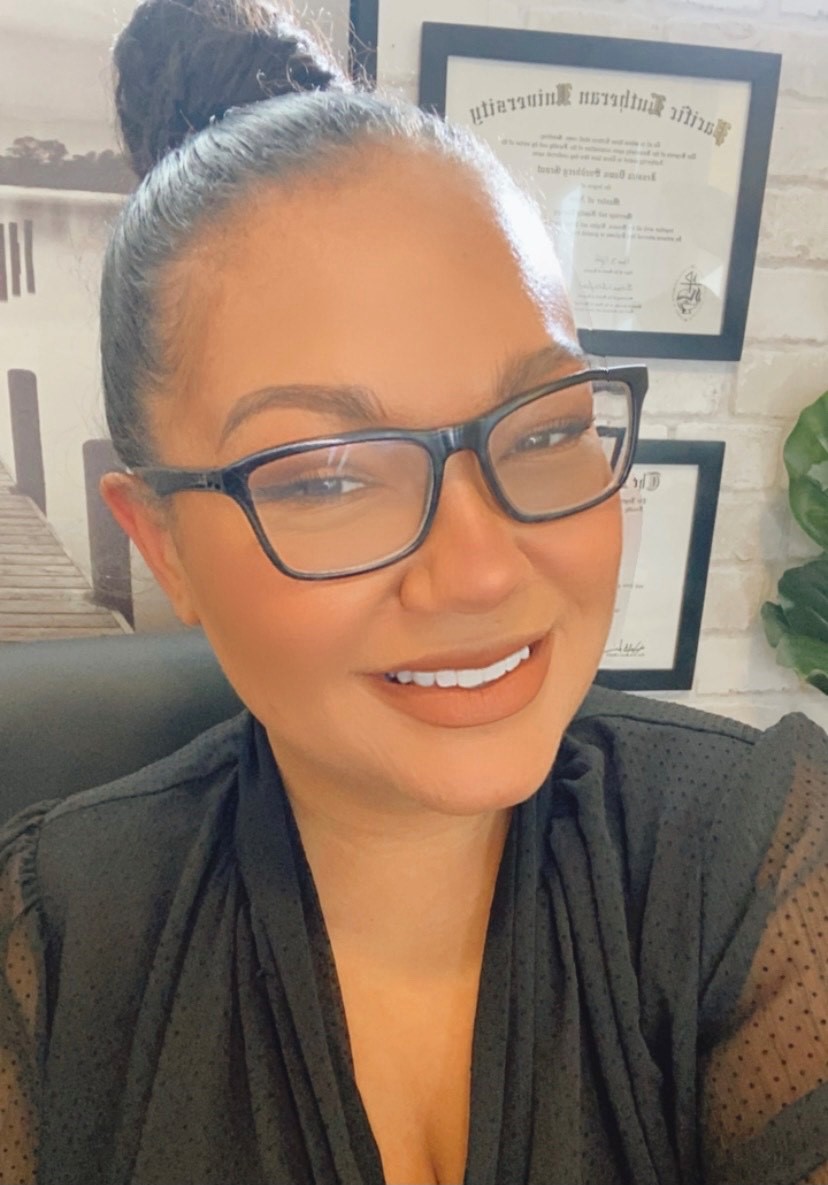
Learn How to Consistently
Make Income With a Podcast
For Faith-Led Entrepreneurs
Profitable Podcast Bootcamp
READ MORE
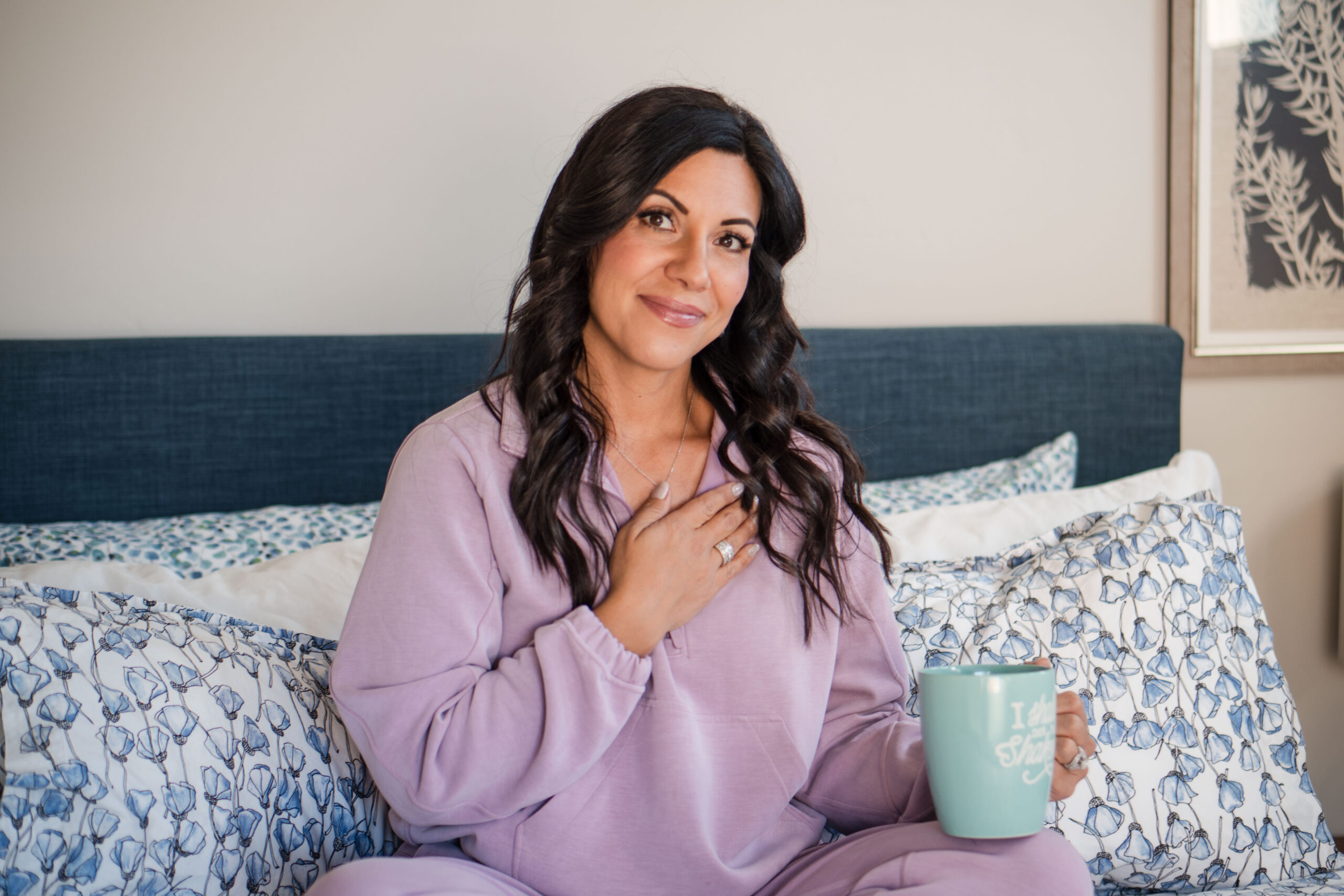
Here are 6 ways I’m scaling my business to 7-figures God’s way and not the world’s way, all without social media.

READ MORE
It’s been a hot minute since we’ve had a conversation around whether podcasting is right for you. A few people recently asked me, “How do I know for sure that podcasting is right for me or my business model?” That’s what I will discuss with you today.

READ MORE
As a 7-figure Christian business owner, Stef shares biblical business advice straight from the book of Proverbs.
READ MORE

This post is for my MLM Girlies or anyone marketing a personal brand or physical product. It’s a live coaching session with one of my students about having a personal brand versus product branding, and what this might look like for you.
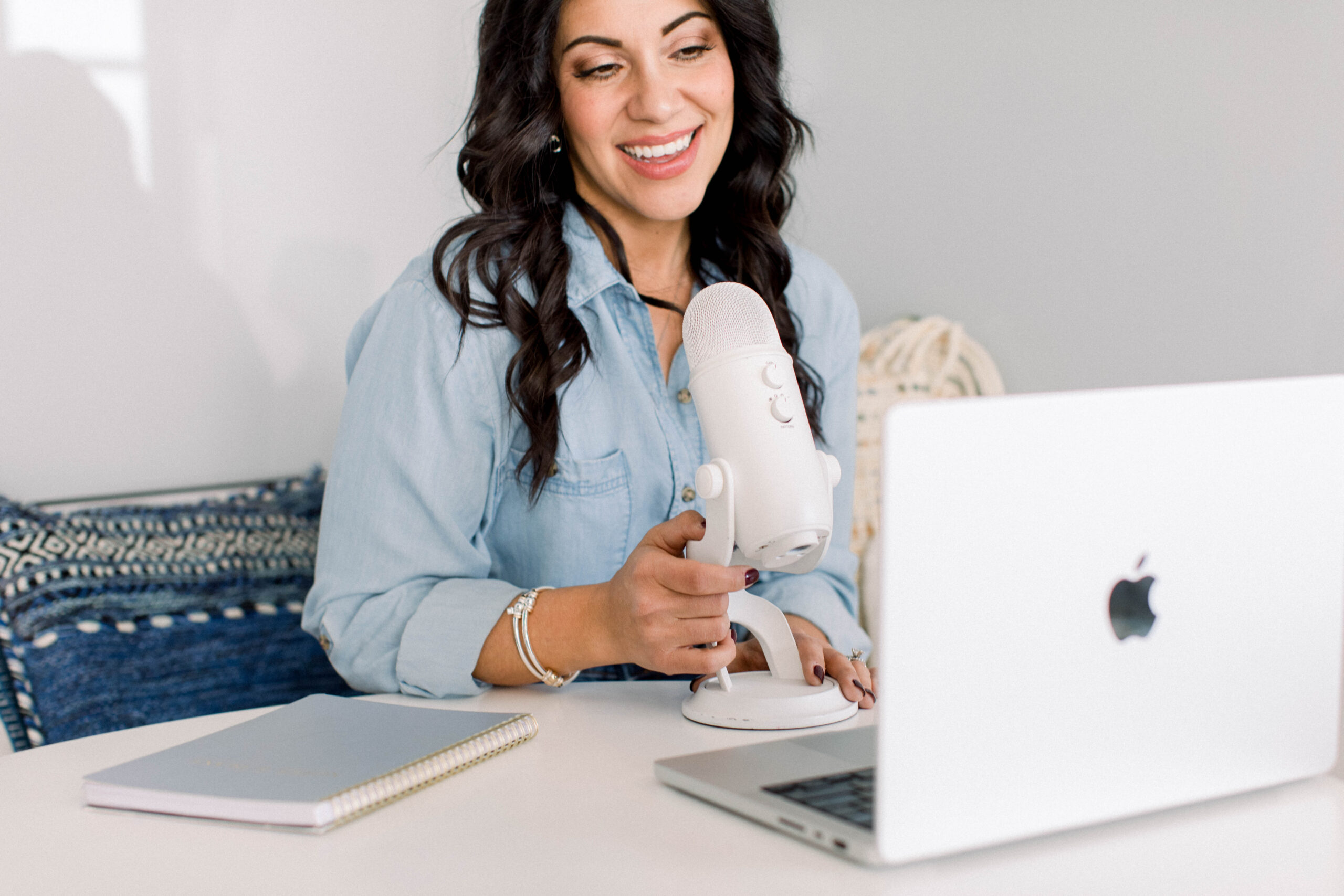
READ MORE
Join me as I chat with Podcast to Profit graduate, Monica Topete, on going from burnout to a top 2% podcast and hundreds of organic leads.
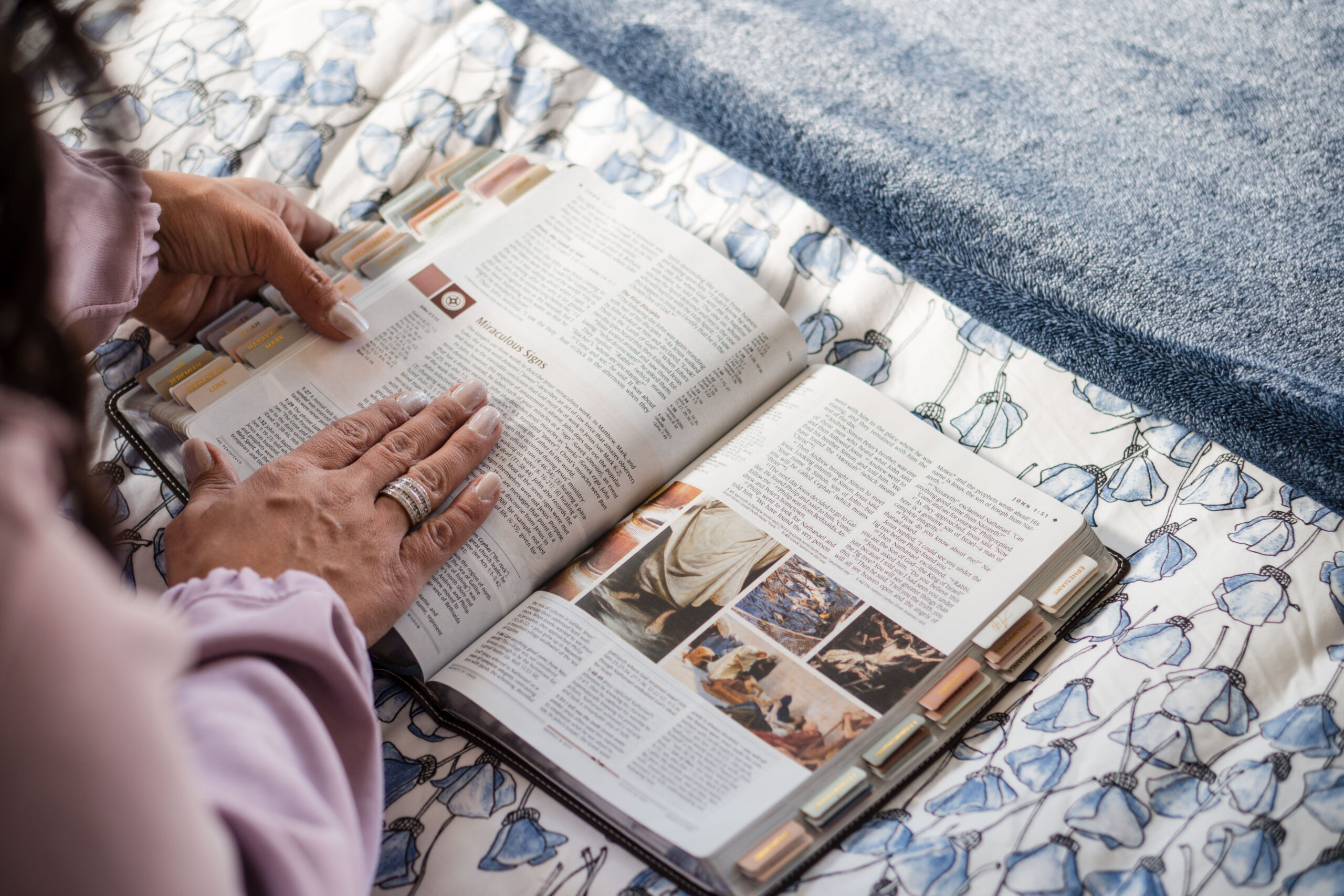
READ MORE
Have you wondered how to use the Bible in your business? What if I told you the best strategy isn’t another mastermind, launching another thing, or listening to another podcast? The best strategy comes from knowing how to use the Bible.
READ MORE
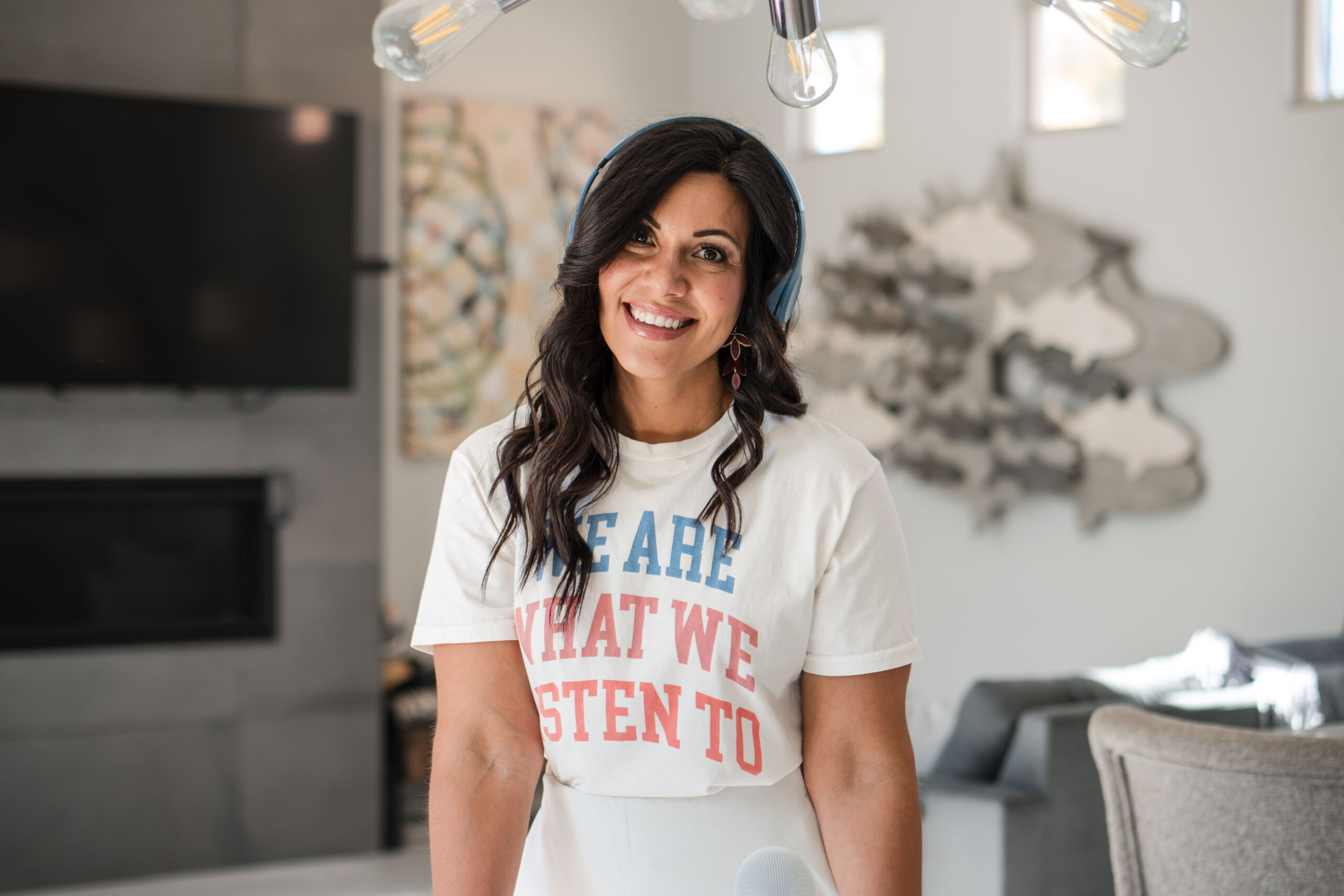
Join Stef as she discusses five ways you can hear from God in your business. The Holy Spirit will lead you if you are paying attention!

READ MORE
If you’ve ever wondered how to go from zero subscribers to millions with your podcast, this post is for you. Whether you’re just starting with no subscribers or you’ve already launched but are struggling to grow, I’ll break down all the things that will help you get your podcast to flourish and be that vessel of growth that you have been praying for.
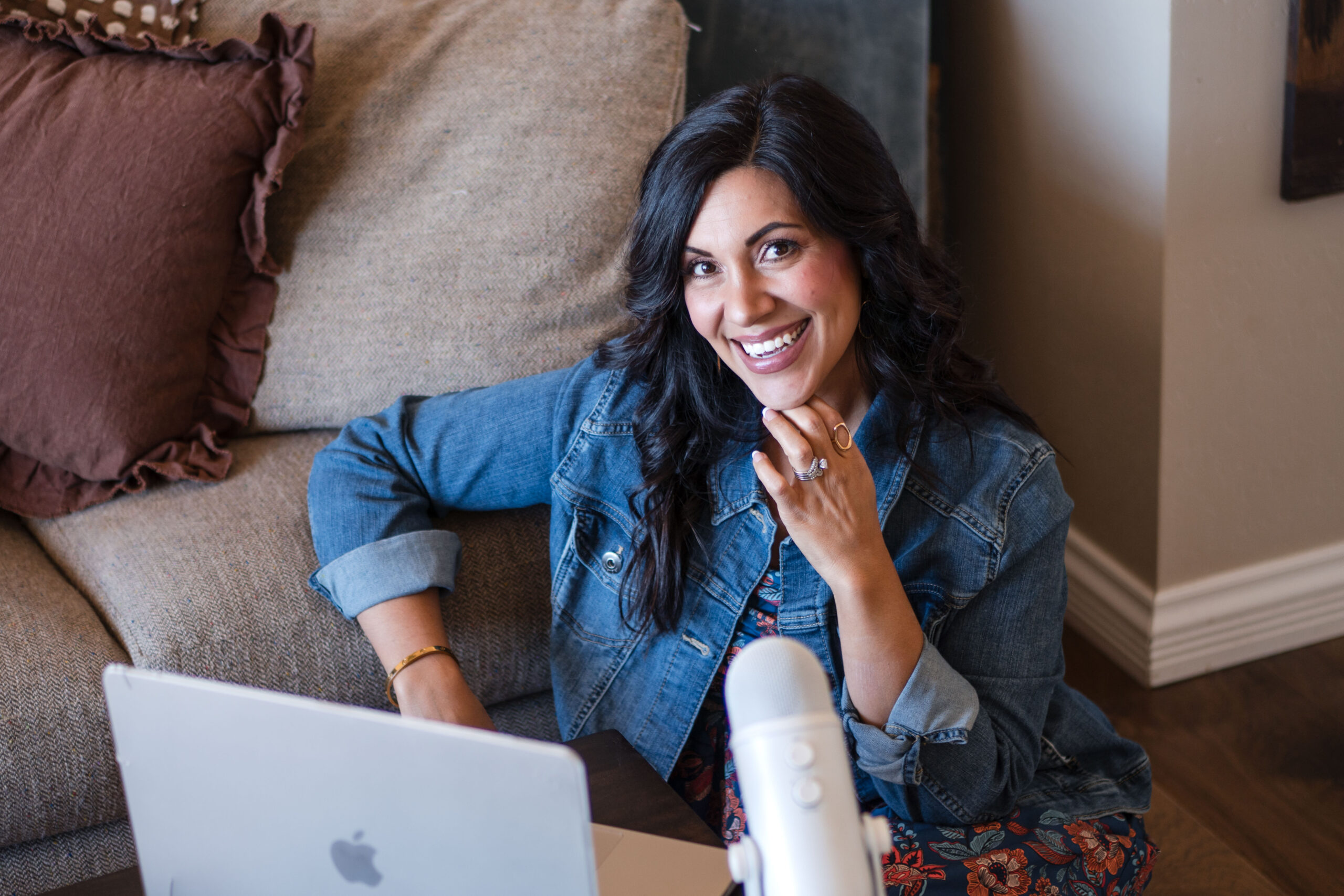
READ MORE
I’m talking to my Podcast to Profit graduate about how her podcast became discoverable around the world after she joined my program.
READ MORE
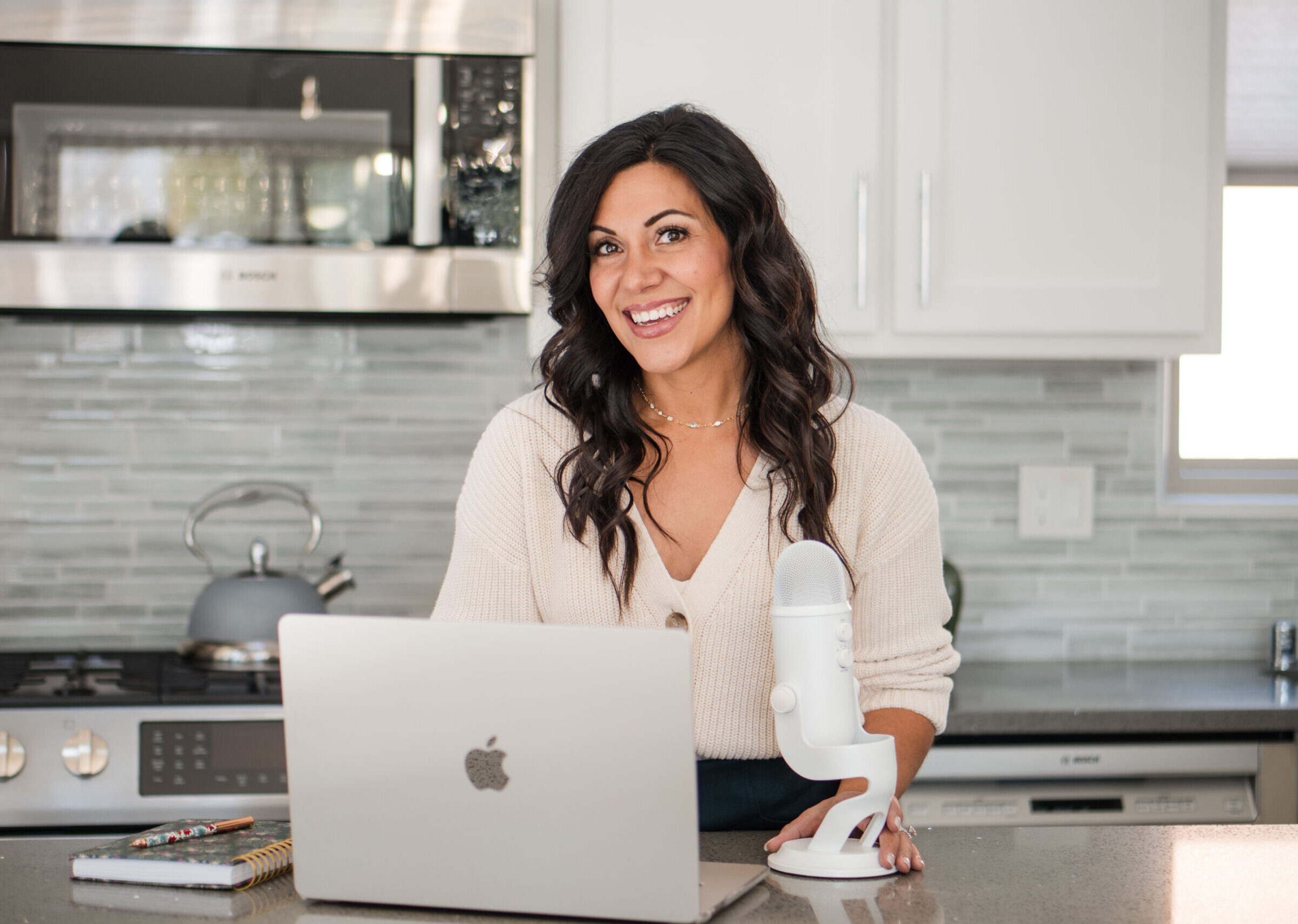
Have you ever wondered how much money a podcast with just a thousand downloads can make? It’s probably more than you think, but not in the method you think.

READ MORE
Join me as I coach my Podcast to Profit student on whether she should rebrand her podcast or stay true to what she already does so well.
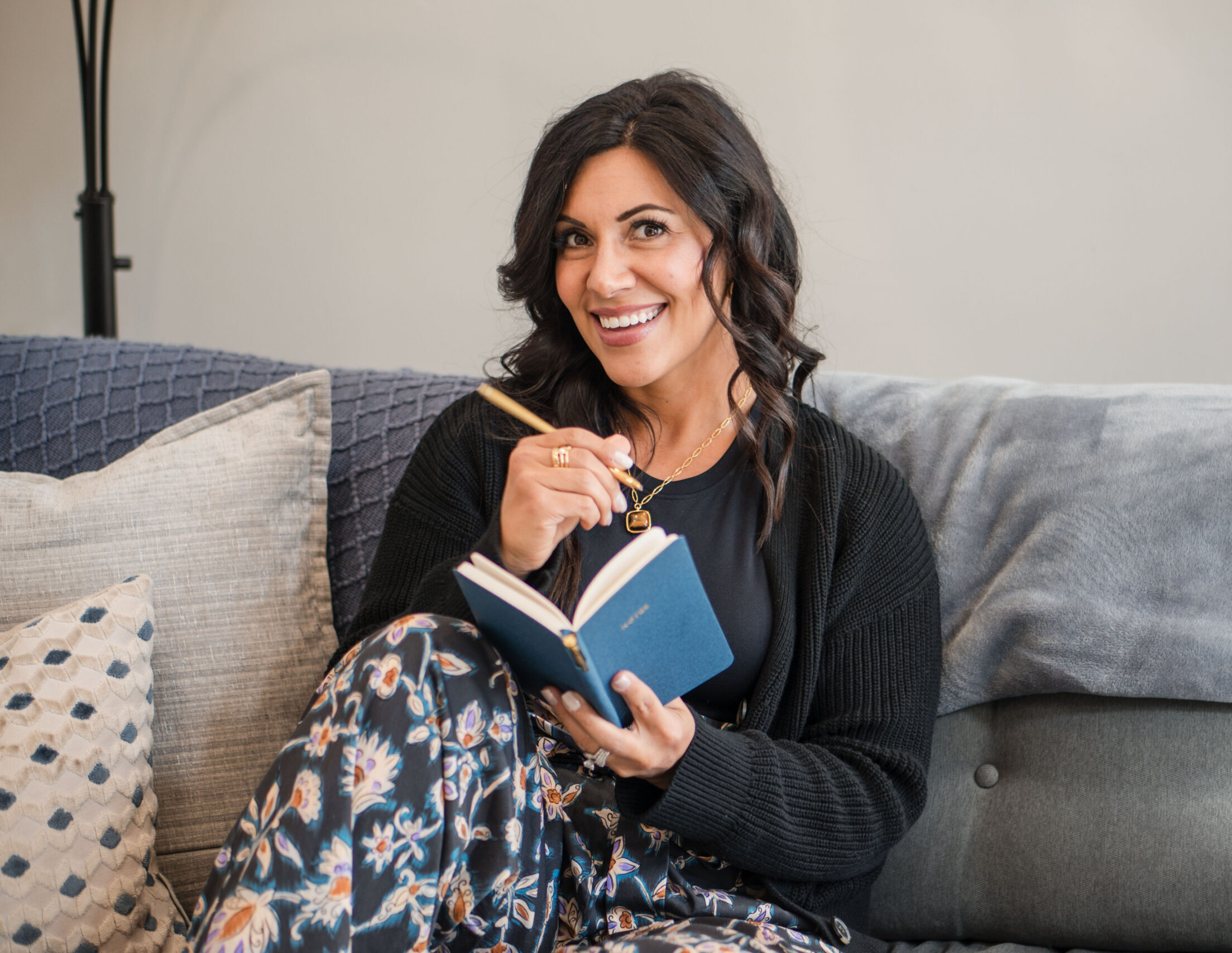
READ MORE
As Christian entrepreneurs, we must pray to God and not run our businesses on our own. We must position God at the center of every decision.
Come Hang Out!
Learn How to Consistently
Make Income With a Podcast
For Faith-Led Entrepreneurs
Join 5-Day Profitable Podcast Bootcamp!
Podcast Launch Checklist
Steps to start and launch a podcast from start to finish
Should You
Start a Podcast?
TAKE THE QUIZ
AND FIND OUT
STEP BY STEP PLAN TO START YOUR ONLINE BUSINESS
Complete Business Blueprint
Is My Group Coaching Program Right For You?
Choose the option below that best describes you!
Have a question?
Ask Stef a question about her resources
or program!
Will podcasting make you money?
Play around with my Profitability Calculator!
Meet Podcast to Profit Alumni
Students and graduates who are profiting from their podcasts
from psalm chapter 18
Spiritual Battle Plan
defeat the enemy, strongholds and spiritual warfare
look around
© STEFANIE GASS LLC 2026 | ALL RIGHTS RESERVED | SITE CREDIT | LEGAL
Come Hang Out!
Come listen to a top 20 podcast for Christians who want to grow a simple, successful online business.
Come listen
to the go-to podcast
So glad you're here!
Visit the resources section and find out which software I personally use and recommend. Become an affiliate, or discover other trusted resources I have to help you succeed on your business and faith journey.
Check out all my recommended resources
including software, affiliates, and freebies.
Read the latest over on the Stef Gass Blog. Tons
of articles to help you succeed in life and business.
Meet Stefanie and learn more about her life, journey, failures and family. Plus, a glimpse of her amazing team.
Book Stef for in-person or virtual events! She will
inspire and educate your audience with her training.
Find out everything your need to feature Stef—bio, photos, and details—ready to inspire and educate your audience
Meet some of the students who are profiting from their podcast
Contact us with questions, concerns,
testimonies, or requests here.
I can't wait to help you get clarity on your calling, grow your business, launch a podcast, build a course, or scale and get visible. Check out the Stefanie Gass School. No more frustration or overwhelm. Just a simple, step-by-step framework to get you where you want to grow.
Get clear on your calling in 4 weeks or less so you
can start your online business with confidence.
Apply for my 6-month group coaching program for podcasters! Build your offer, learn to sell, and scale.
Visit the Stefanie Gass School to discover what step
you're on and and learn which course is right for you!
Launch a podcast in less than 30 days! 12 simple
steps to go from idea to successful podcast.
Let's work together!
WORK WITH ME
Clarify Your Calling
Free Workshop
Watch this workshop and get
clear on your calling so you can start
an online business! Hop on this quick,
35 minute free training and map out
your next steps!
Podcast for Growth
Free Workshop
Watch this workshop and learn how
podcasting works to make money online! Find out why podcasting is the best long-form content outlet and how it can drive more leads than social media.


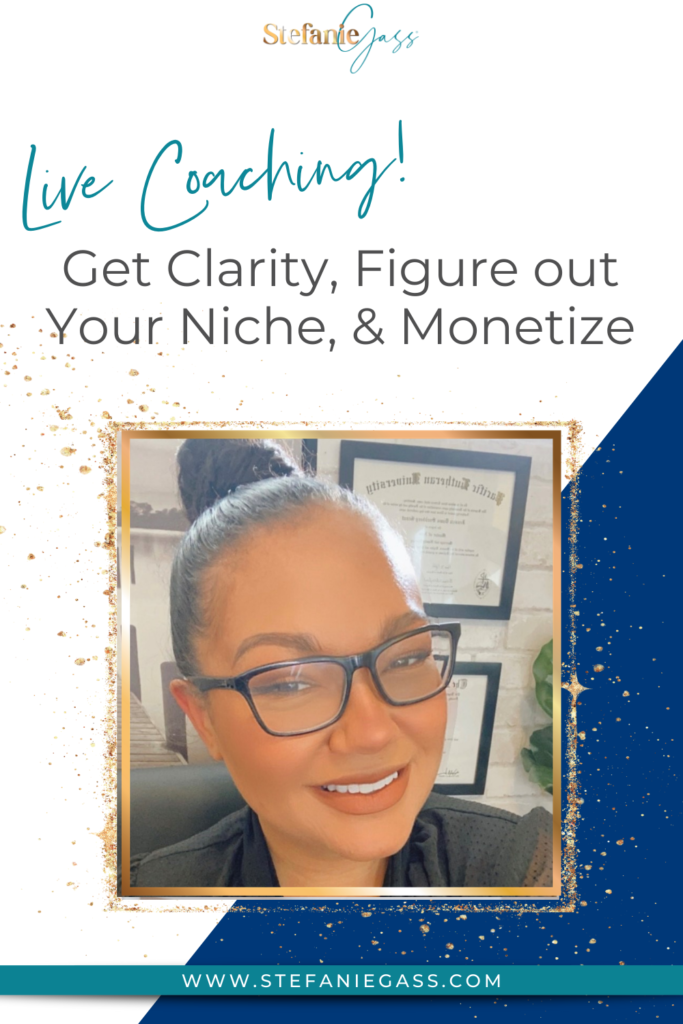
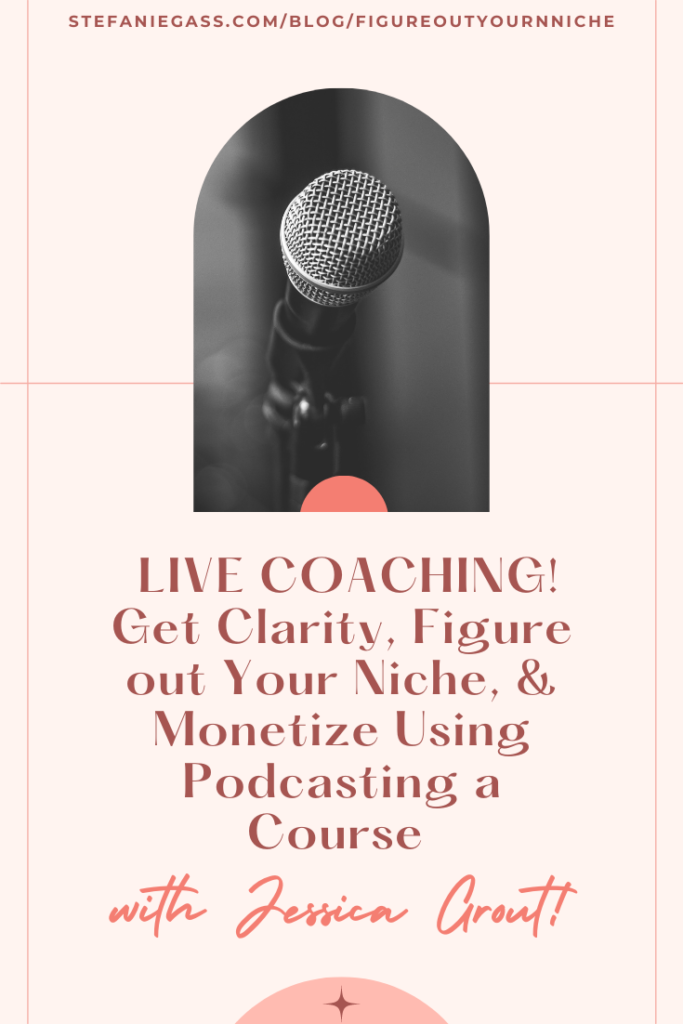
Leave Comment or Question Below